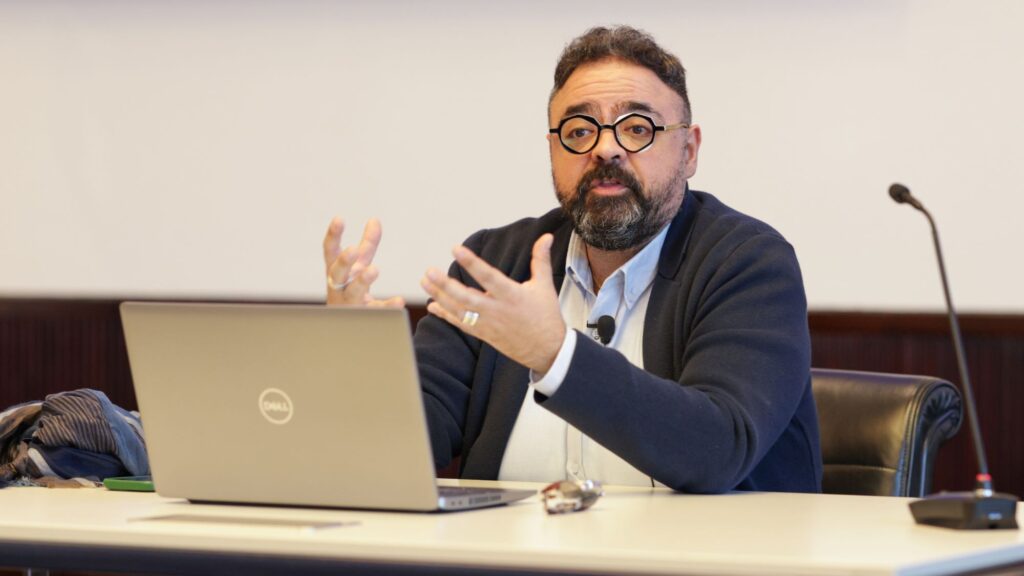A Journey of Reflection and Service: Father Jad Chebly Discusses Living Values at GU-Q

To foster values-based learning and interfaith dialogue on campus, Georgetown University in Qatar (GU-Q) welcomed Father Jad Chebly, SJ, from Saint Joseph University of Beirut (USJ), as a Visiting Jesuit. Father Jad shared his extensive experience in teaching, spiritual guidance, and community leadership with the GU-Q community.
The former Director and Founder of Al Mazeed NGO, Father Jad is the Director of Campus Ministry at USJ and a former chaplain at Georgetown University in Washington, DC. Reflecting on the visit to Georgetown’s campus in Qatar, he said “I am grateful for the warm welcome and deeply meaningful two weeks spent at GU-Q. I was reminded how important it is to work collectively to provide young people today with safeguards and criteria for discernment.”
Demonstrating the Jesuit value of Contemplation in Action, Father Jad delivered a talk in Dr. Magda Rostron’s writing class on Antoine de Saint-Exupéry’s The Little Prince, encouraging students to explore the complexities of the human soul and the relationships that define our lives. During the Senior Escape retreat, Father Jad facilitated further reflective sessions based on the themes of the book, encouraging students to contemplate on their personal growth during their time at GU-Q.
He also offered a thought-provoking public lecture on Vatican Diplomacy for GU-Q’s students of international affairs, asking them to reflect on the intersection of spiritual governance and diplomacy through the history of how the Vatican has influenced political decisions and continues to shape global events today.
“The purpose of [Vatican] diplomacy is to represent a spiritual entity, the church, and its leader the Pope, and it also seeks to influence world issues in the name of the universal common good,” he explained, asking students to consider what it means to advocate for your beliefs in today’s polarized world.
During a workshop with faculty and staff, Father Jad shared the Principles of Ignatian Leadership, offering insight into how to lead within a values framework. Key principles included striving for excellence by being the best one can be in each moment, fostering inclusivity and respect within teams, taking action-oriented initiatives, and championing justice by living by one’s values. Engaging with departments one-on-one he encouraged deep reflection on the work that they do, and how that contributes to the collective purpose of the institution.
[Call Out] Ignatian Leadership Principles According to Father Jad
- Strive for excellence: Be the best you can be in each moment of your day. Don’t compare yourself with others or even yourself at a different moment.
- Care for others: As a leader, take care of others and help them be the best that they can be.
- Accept diversity: Respect each team member’s individual rhythms and speed, and give them space to thrive.
- Be action-oriented: Take on challenges and champion new initiatives, discover new frontiers…and travel with your team to get there.
- Promote justice: Live by your values and help others develop their own relationship with something greater than their own interests. Use this strength to fight injustice.
- Inspire others towards good: Lead by example by being truthful, reflective, admitting your mistakes, and knowing your limits.
Father Jad continued to engage with the community during his visit through open office hours, extensive engagement with the theology faculty, and a Mass service for the community, fostering the Jesuit values of Interreligious Understanding, and Community in Diversity.
“Georgetown University’s Jesuit heritage is at the heart of our educational mission,” said Anne Nebel, Associate Dean for Teaching, Learning and Assessment at GU-Q, “we were happy to host Father Jad as a means of building collaborations between our institutions, reinforcing our commitment to living out the values of service, reflection, and leadership.”
Georgetown University in Qatar is celebrating its 20th anniversary, marking two decades of contributions to the value-based knowledge economies of the Global South.